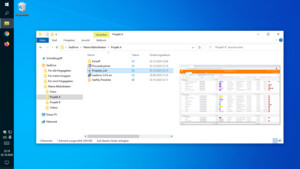dom6770
Captain
- Registriert
- Sep. 2011
- Beiträge
- 3.559
Hey Leute,
Habe seit heute einen VPS (Classic) von ohv.de. Er soll meinen 10€ Windows vServer ersetzen.
Darauf soll TS3 und BNC laufen, mehr nicht
Jetzt habe ich allerdings Probleme mit TS3. Es will einfach unter Debian 7 x64 nicht laufen.
Testweise habe ich mal Ubuntu 14.04 Server installiert, dort funktionierte es.
Ich habe den User ts3 erstellt und das Verzeichnis /usr/local/ts3 erstellt.
Dort habe ich den TS3 Server mit der Datenbank vom Windows Server heruntergeladen und entpackt.
Anschließend chmod gesetzt und mit dem User ts3 eingeloggt.
Wenn ich ihn jetzt aber starte, erhalte ich über die Logs eine Fehlermeldung. Beim Paramter status erhalte ich die Meldung "Server seems to have died".
Im Log steht folgendes:
Danach habe ich beide Error's der letzten beiden Zeilen per Google gesucht und auf folgenden Fix gestoßen:
https://support.teamspeakusa.com/in...-error-instance-check-error-how-do-i-fix-this
Beim Ausführen des Befehls erscheint aber die nächste Fehlermeldung
nach weiterer Recherche bin ich auf folgenden Thread gestoßen:
http://forum.teamspeak.com/showthread.php/93623-Instance-check-error-on-Unix?p=365846#post365846
Egal was ich mit /dev/shm mache, es folgt immer die Fehlermeldung "Too many levels of symbolic links".
Ich wäre echt froh, wenn mir einer bei meinem Problem helfen könnte.
Gruß
Habe seit heute einen VPS (Classic) von ohv.de. Er soll meinen 10€ Windows vServer ersetzen.
Darauf soll TS3 und BNC laufen, mehr nicht
Jetzt habe ich allerdings Probleme mit TS3. Es will einfach unter Debian 7 x64 nicht laufen.
Testweise habe ich mal Ubuntu 14.04 Server installiert, dort funktionierte es.
Ich habe den User ts3 erstellt und das Verzeichnis /usr/local/ts3 erstellt.
Dort habe ich den TS3 Server mit der Datenbank vom Windows Server heruntergeladen und entpackt.
Anschließend chmod gesetzt und mit dem User ts3 eingeloggt.
Wenn ich ihn jetzt aber starte, erhalte ich über die Logs eine Fehlermeldung. Beim Paramter status erhalte ich die Meldung "Server seems to have died".
Im Log steht folgendes:
Code:
2014-10-13 17:15:54.089930|INFO |ServerLibPriv | | TeamSpeak 3 Server 3.0.11 (2014-09-29 15:33:46)
2014-10-13 17:15:54.090083|INFO |ServerLibPriv | | SystemInformation: Linux 2.6.32-042stab092.3 #1 SMP Sun Jul 20 13:27:24 MSK 2014 x86_64 Binary: 64bit
2014-10-13 17:15:54.091151|INFO |DatabaseQuery | | dbPlugin name: SQLite3 plugin, Version 2, (c)TeamSpeak Systems GmbH
2014-10-13 17:15:54.091202|INFO |DatabaseQuery | | dbPlugin version: 3.6.21
2014-10-13 17:15:54.091670|INFO |DatabaseQuery | | checking database integrity (may take a while)
2014-10-13 17:15:54.155739|WARNING |Accounting | | Unable to find valid license key, falling back to limited functionality
2014-10-13 17:15:54.157060|ERROR |Accounting | | failed to register local accounting service
2014-10-13 17:15:54.157109|ERROR |ServerLibPriv | | Server() error while starting servermanager, error: instance check errorDanach habe ich beide Error's der letzten beiden Zeilen per Google gesucht und auf folgenden Fix gestoßen:
https://support.teamspeakusa.com/in...-error-instance-check-error-how-do-i-fix-this
Beim Ausführen des Befehls erscheint aber die nächste Fehlermeldung
Code:
mount: Too many levels of symbolic linksnach weiterer Recherche bin ich auf folgenden Thread gestoßen:
http://forum.teamspeak.com/showthread.php/93623-Instance-check-error-on-Unix?p=365846#post365846
Egal was ich mit /dev/shm mache, es folgt immer die Fehlermeldung "Too many levels of symbolic links".
Ich wäre echt froh, wenn mir einer bei meinem Problem helfen könnte.
Gruß



